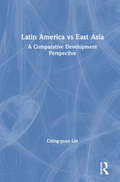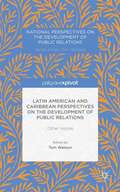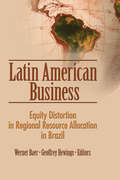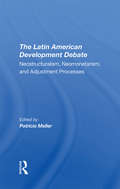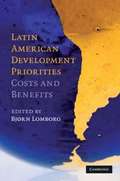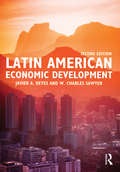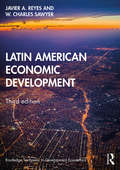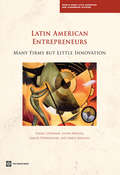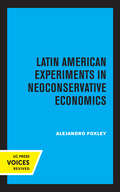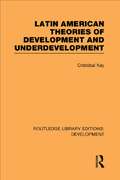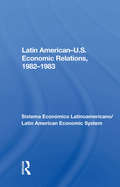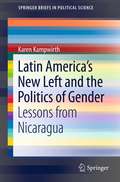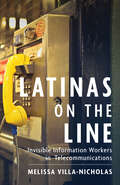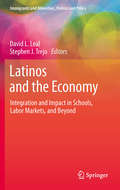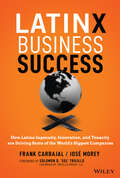- Table View
- List View
Latin America vs East Asia: A Comparative Development Perspective
by Jingyuan LinThis study makes a solid case for the now prevalent contention that the development model of East Asian NICs is less costly (i.e. over inflation levels and more equitable income distribution), more adaptive to fluctuating would market conditions (eg. successful adjustment to the two oil crises) and more sustainable (i.e. high growth rates, even in the turbulent 1970s) than that of the Latin American NICs. In considering these issues, this book examines the major Latin American countries' economic problems and development experiences in light of the more successful stabilization and development experiences of the East Asian countries, Taiwan and South Korea in particular.
Latin American and Caribbean Perspectives on the Development of Public Relations: Other Voices
by Tom WatsonThe National Perspectives on the Development of Public Relations: Other Voices series is the first to offer an authentic world-wide view of the history of public relations. It will feature six books, five of which will cover continental and regional groups. This book in the series focuses on Latin America and the Caribbean.
Latin American and Iberian Entrepreneurship: New Perspectives on Culture, Traditions and Heritage (Contributions to Management Science)
by João Leitão Vanessa Ratten Vitor BragaLatin American and Iberian entrepreneurship represents a special kind of innovation, risk-taking, and futuristic business activity based on a common cultural heritage. There has been an increased interest in entrepreneurship related to specific cultural groups, and this edited book will be among the first to provide a Latin American and Iberian perspective to the study of entrepreneurship, thereby acknowledging the role of the Spanish and Portuguese diaspora and language on the global economy. Each chapter will focus on a different aspect of entrepreneurship related to countries within Latin America and Iberia. By combining both geographical groups, the authors aim to provide a better understanding of how Latin culture permeates entrepreneurial business activities.
Latin American Business: Equity Distortion in Regional Resource Allocation in Brazil
by Werner Baer Geoffrey HewingsExamine the costs and benefits of fiscal "wars" between Brazilian statesLatin American Business examines Brazil&’s use of fiscal incentives to attract investors to help remedy disparities in the country&’s regional distribution of income. Since the 1990s, individual Brazilian states have taken the initiative in trying to lure domestic and foreign firms to locate within their borders, targeting the automotive industry, textiles, and shoe production. But their efforts have led to mixed results and questions about whether these fiscal wars have been legitimate attempts at regional economic development or simply a distortion in the allocation of resources. This insightful collection of case studies and essays sheds considerable light on the issue. For several generations, the notion has been debated both in advanced industrial countries and in developing countries that regional differences in income will gradually be eliminated as poor regions (where money is scare but labor is not) benefit from the inflow of investments. In reality, this has rarely happened; Latin American Business examines why that has been the case in Brazil. The book&’s contributors fuel this continuing debate, analyzing topics that include Bahia&’s efforts to attract a Ford plant, the Mercedes-Benz project in Juiz de Fora, the case of Renault in Paraná, fiscal incentive programs in Pernambuco, and the tax incentive policies of Ceará. Latin American Business includes: an evaluation of the costs and benefits of federal and state incentives given to Ford Motor Company to attract a plant in Bahia an analysis of the use of state and municipal incentives by the state of Minas Gerais in dealing with Mercedes-Benz Corporation a look at Paraná&’s agreement with Renault and the degree to which it has created jobs and attracted other investments an examination of structural changes in the Brazilian automotive industry a look at the Brazilian automotive industry in the 1990s an evaluation of the results of Pernambo&’s fiscal incentives program from 1996 to 2003 a discussion of the economic logic for tax incentives a look at the economic effects of regional tax incentives and much moreLatin American Business is an essential resource for academics, business practitioners, public policymakers, and anyone working in the international development community.
Latin American Business Cultures
by Robert Crane Carlos RizowyHow often has an American or European businessman been astonished to have his Mexican or Brazilian counterpart break off discussions without explanation and refuse to return his calls? This book helps non-Latin American businessmen or MBA students address the region. If you want to study or work in Latin America this is a must read.
The Latin American Development Debate: Neostructuralism, Neomonetarism, And Adjustment Processes
by Patricio MellerIn the 1980s Latin America experienced its second worst economic crisis of the century; today the average per capita income is about 10 percent less than a decade ago. Because the crisis affected all Latin American countries regardless of their economic policies, the period has become known as "the lost decade in Latin America." In this book, eminent economists from the region reexamine strategies of development—structuralism versus monetarism, liberalism versus statism, growth versus equity—in light of new theoretical knowledge and recent economic events. The essays offer a complex interpretation of development problems and seek to explain how different schools of thought could be compatible and how old debates must be recast in the light of structural changes in Latin American economies. In addition, contributors critically review the adjustment processes applied in various countries. Together the chapters offer a penetrating analysis of what went wrong in Latin America in the 1980s and a careful assessment of economic measures and policies that might prove viable in promoting stable and growing economies, democratic regimes, and social justice.
Latin American Development Priorities: Costs and Benefits
by Bjørn LomborgMany countries in Latin America and the Caribbean have achieved considerable economic growth, yet the region still faces many seemingly intractable problems. The conventional wisdom in development agencies - that prioritization is impossible and that everything must be done - is simply not effective. Latin American Development Priorities shows how limited resources could be used for the greatest benefit of the Latin American and Caribbean region. A panel of economists met over three days in San José to review proposals to tackle the ten most important challenges, which emerged from a survey by the Inter-American Development Bank. The expert panel was asked a question which appears simple but is actually very difficult to answer: What should Latin American governments do with an additional nominal $10 billion? Hard choices are needed if Latin America's problems are to be tackled effectively. This book provides the means to make those choices as objectively as possible.
Latin American Economic Development
by Javier A. Reyes W. Charles SawyerLatin America is one of the most intriguing parts of the world. The region’s illustrious history, culture, and geography are famous internationally, but in terms of economics, Latin America has been generally associated with problems. For many, the combination of a resource rich region and poor economic conditions has been a puzzle. This extensively revised and updated second edition of Latin American Economic Development continues to provide the most up to date exploration of why the continent can be considered to have underperformed, how the various Latin American economies function, and the future prospects for the region. The book addresses the economic problems of Latin America theme by theme. Changes and new features in this new edition include: Expanded coverage of how institutions affect economic growth in Latin America Many new boxes and questions for review and discussion New material on how climate change affects the region Updated material to reflect the ongoing macroeconomic stability of the past decade A new chapter on the political economy of Latin America The book provides a comprehensive text for undergraduate economics courses on Latin America, and is also suitable for use by students in other disciplines looking for a wide-ranging guide to the region. This book will continue to be an invaluable resource for undergraduates looking at Latin American economics, growth, and development.
Latin American Economic Development (Routledge Textbooks in Development Economics)
by Javier A. Reyes W. Charles SawyerLatin America is one of the most intriguing parts of the world. The region’s illustrious history, culture, and geography are famous internationally, but in terms of economics, Latin America has been generally associated with problems. For many, the combination of a resource-rich region and poor economic conditions has been a puzzle.This extensively revised and updated third edition of Latin American Economic Development continues to provide the most up-to-date exploration of why the continent can be considered to have underperformed, how the various Latin American economies function, and the future prospects for the region. The book addresses the economic problems of Latin America theme by theme.Changes and new features in this new edition include: • a new chapter on economic growth that reflects the new understanding of slow growth in the region;• two new appendices on basic microeconomics and macroeconomics;• expanded coverage on new commodities such as lithium and quinoa;• a number of new boxes and updates to existing boxes. The book provides a comprehensive text for undergraduate economics courses on Latin America and is also suitable for use by students in other disciplines looking for a wide-ranging guide to the region. This book will continue to be an invaluable resource for undergraduates looking at Latin American economics, growth, and development.
Latin American Entrepreneurs
by Daniel Lederman Julian Messina Jamele Rigolini Samuel PienknaguraEntrepreneurship -- manifested in the entry of new firms or products into new markets, or substantial improvements in technological capacity or process innovation by incumbent firms -- is widely considered to be an important ingredient for long term economic development. This report argues that entrepreneurship is also a source of employment generation, export growth, and resilience during economic downturns. Although the conventional wisdom suggests that Latin American and Caribbean countries underperform relative to China and other emerging markets in terms of its entrepreneurial dynamism, this report provides evidence suggesting that the region is characterized by substantial entrepreneurship. The main challenge in the region is not a lack of entrepreneurs, but rather their relatively low level of innovation and the slow growth of incumbent firms. The report discusses the nature of new entrants into markets and the factors that might help stimulate private-sector innovation after firms have survived the initial test of market competition.
Latin American Experiments in Neoconservative Economics
by Alejandro FoxleyThis title is part of UC Press's Voices Revived program, which commemorates University of California Press’s mission to seek out and cultivate the brightest minds and give them voice, reach, and impact. Drawing on a backlist dating to 1893, Voices Revived makes high-quality, peer-reviewed scholarship accessible once again using print-on-demand technology. This title was originally published in 1983.
Latin American Migrations to the U.S. Heartland: Changing Social Landscapes in Middle America
by Linda Allegro Andrew Grant WoodResponding to inaccuracies concerning Latino immigrants in the United States as well as an anti-immigrant strain in the American psyche, this collection of essays examines the movement of the Latin American labor force to the central states of Oklahoma, Kansas, Nebraska, Arkansas, Missouri, and Iowa. Contributors look at the outside factors that affect migration including corporate agriculture, technology, globalization, and government, as well as factors that have attracted Latin Americans to the Heartland including religion, strong family values, hard work, farming, and cowboy culture. Several essays also point to hostile neoliberal policy reforms that have made it difficult for Latino Americans to find social and economic stability. The varied essays in Latin American Migrations to the U.S. Heartland seek to reveal the many ways in which identities, economies, and geographies are changing as Latin Americans adjust to their new homes, jobs, and communities. Contributors are Linda Allegro, Tisa M. Anders, Scott Carter, Caitlin Didier, Miranda Cady Hallett, Edmund Hamann, Albert Iaroi, Errol D. Jones, Jane Juffer, Laszlo J. Kulcsar, Janelle Reeves, Jennifer F. Reynolds, Sandi Smith-Nonini, and Andrew Grant Wood.
Latin American Peasants
by Tom BrassThe essays in this collection examine agrarian transformation in Latin America and the role in this of peasants, with particular reference to Bolivia, Peru, Chile, Brazil and Central America. Among the issues covered are the impact of globalization and neo-liberal economic policies.
Latin American Theories of Development and Underdevelopment (Routledge Library Editions: Development)
by Cristóbal KayUpon its publication in 1989, this was the first systematic and comprehensive analysis of the Latin American School of Development and an invaluable guide to the major Third World contribution to development theory. The four major strands in the work of Latin American Theorists are: structuralism, internal colonialism, marginality and dependency. Exploring all four in detail, and the interconnections between them, Cristobal Kay highlights the developed world’s over-reliance on, and partial knowledge of, dependency theory in its approach to development issues, and analyses the first major challenges to neo-classical and modernisation theories from the Third World.
Latin American-u.s. Economic Relations, 1982-1983
by Avraham SelaThis book, prepared by the Permanent Secretariat of the Latin American Economic System (SFXA), analyzes a range of factors in the current economic policies of the United States that affect Latin American and Caribbean countries. In particular, it pinpoints the effects of U.S. monetary policy on the region's economies and trade relations and on the
Latin America's Emerging Middle Classes
by Jeff Dayton-JohnsonWhat does it mean to be middle-class in Latin America? How is the middle class changing? What are the implications for economic development? Many look to the emergence of a middle class as a sign of Latin America's success in reducing poverty and inequality, a claim this book confirms. Political and business leaders hope that a booming middle class will drive economic growth and support progressive but not revolutionary political platforms, lending economic and democratic stability to countries long wracked by volatility. The contributors document the remarkable emergence of this middle group in Latin America (whose measurement turns out not to be an easy task). However, the authors consider it premature to declare middle-class Latin Americans ready to serve as a motor for economic growth or guarantors of democratic consolidation. Smart policies can nevertheless protect middle classes from poverty and allow them to fulfil the hopes invested in them.
Latin America's New Left and the Politics of Gender
by Karen KampwirthThe majority of Latin Americans now live in countries that are governed by democratically elected governments on the political left, which is unprecedented in that region. This book analyzes this occurrence by asking a question that up until now has been largely ignored in the literature on the contemporary Latin American left: to what extent have these governments governed with, and promoting the interests of, the women's movements that are an important part of their base of support? This question is examined by focusing on a critical case that is rarely analyzed in the literature on the new Latin American left, the case of Nicaragua. The broader implications for Latin America will be shown, making this book of interest to researchers and graduate students in Latin American studies as well as gender studies and political science.
Latina/o College Student Leadership: Emerging Theory, Promising Practice
by Lozano Guardia Susana Muñoz Moises Orozco Alicia Rodríguez Cristobal Salinas Cecilia Suarez Jesse Villalobos Nancy Barceló Cameron Beatty Eduardo Coronel Juan Escalante Juan Guardia Veronica Kann Corina Lopez Adele LozanoLatina/o College Student Leadership: Emerging Theory, Promising Practice examines Latina/o college student leadership and leadership development in higher education. This edited collection examines emerging frameworks, empirical research, leadership models, essays, and promising practices from the perspectives of scholars, educators, practitioners, and activists. Latina/o student leadership is analyzed through the lens of various institutional contexts (e.g. large research institution, community college, Hispanic-serving institution) as well as diverse intra-institutional contexts (e.g. academic, student organizations, student government, fraternities and sororities). The focus on theory and practice within various contexts, combined with an emphasis on student voice, helps provide deeper insight into how Latina/o students experience leadership in higher education, as well as how to promote and support the leadership development of Latina/o college students.
Latinas on the Line: Invisible Information Workers in Telecommunications (Latinidad: Transnational Cultures in the United States)
by Melissa Villa-NicholasLatinas on the Line provides a compelling analysis and historical and theoretical grounding of the oral histories, never before seen, of Latina information workers in the Bell System from their entrance in 1973 to their retirements by 2015. Author Melissa Villa-Nicholas demonstrates the importance of Latinas of the field of telecommunications through their own words and uses supporting archival research to provide an overview of how Latinas engage and remember a critical analysis of their work place, information technologies, and the larger globalized economy and shifting borderlands through their intersectional identities as information workers. The book offers a rich and engaging portrait of the critical history of Latinas in telecommunications, from their manual to automated to digitized labor.
Latinnovating: Green American Jobs and the Latinos Creating Them
by Graciela Tiscareño-SatoThis book profiles ten different career paths to becoming an environmental entrepreneur. This is the first book showcasing Latino-led innovation and entrepreneurship in the green economy. These ten case studies across ten sectors of our economy will inspire young people to follow these successful footsteps and emulate these highly educated, courageous Latino leaders as they create sustainable, industrial and social justice solutions to benefit all Americans.
Latino Small Businesses and the American Dream: Community Social Work Practice and Economic and Social Development
by Melvin DelgadoLatino small businesses provide social, economic, and cultural comfort to their communities. They are also excellent facilitators of community capacity—a major component of effective social work practice. Social work practitioners have a vested interest in seeing such businesses grow, not only among Latinos but all communities of color. Reviewing the latest research on formal and informal economies within urban communities of color, Melvin Delgado lays out the demographic foundations for a richer collaboration between theory and practice. Delgado deploys numerous case studies to cement the link between indigenous small businesses and community well-being. Whether regulated or unregulated, these establishments hire from within and promote immigrant self-employment. Latino small businesses often provide jobs for those whose criminal and mental health backgrounds intimidate conventional businesses. Recently estimated to be the largest group of color running small businesses in the United States, Latino owners top two million, with the number expected to double within the next few years. Joining an understanding of these institutions with the kind of practice that enables their social and economic improvement, Delgado explains how to identify and mobilize the kinds of resources that best spur their development.
Latinos and the Economy: Integration and Impact in Schools, Labor Markets, and Beyond
by Stephen J. Trejo David L. LealAt 15.4 percent of the population, Latinos are the largest minority group in the United States. They are a growing presence in all sectors of the economy, play an increasingly important role in government and politics, and are influential across a wide range of cultural domains. Despite the growing attention paid to Latinos in recent years, this population is characterized by relatively low socio-economic status, and Latinos frequently rank behind the majority white population and other minority groups when it comes to education, finances, and employment. This book contributes to the understanding of these issues by addressing a comprehensive range of topics on Latino economic incorporation, outcomes, and impact over an individual's lifetime. The volume starts with the foundational issue of education, and then moves to immigrant integration and adjustment, Latino and immigrant earnings, the economic impact of Latinos, and inter-generational incorporation and long-term integration issues. The contributions provide wide-ranging perspectives on the key factors that determine whether Latinos will be able to achieve their economic potential. The substantial individual, national, and international implications of these studies make this book of interest to scholars and policy-makers alike, particularly those concerned with the issues of education, immigration, employment, and earnings. The rapid and continuing growth of the Hispanic population ensures that the debate over social policy in the next few decades will increasingly focus on how best to alleviate the economic and social problems facing this population and perhaps encourage rapid assimilation. The studies in the volume edited by David Leal and Stephen Trejo provide an excellent foundation for this discussion. The conceptual issues and findings in these papers are sure to be valuable to both policy makers and researchers. George Borjas, Robert W. Scrivner Professor of Economics and Social Policy, John F. Kennedy School of Government, Harvard University Latinos and the Economy provides a truly authoritative but accessible compilation of first-rate scholarship on Hispanic incorporation, educational and political gains, and ongoing economic and cultural impacts. It is "must reading" for anyone concerned about the future, especially as America moves inexorably towards becoming a majority-minority society by mid-century. Daniel T. Lichter, Ferris Family Professor, Department of Policy Analysis and Management, Cornell University This is the volume to read for anyone interested in current American immigration issues or the role of Hispanics in the U.S. economy." Daniel S. Hamermesh, Killam Professor of Economics, University of Texas at Austin "The future of America is closely intertwined with the successful integration--economically, politically, and socially--of the Latino population. Latinos now comprise one of every seven workers and almost one of every five students in the United States. The research reported in this volume describes the challenges faced by Latinos in schools, the labor market, and in communities and explains their prospects for upward mobility. These studies suggest that a significant investment in expanding educational opportunities may be the single most important policy lever to incorporate Latinos into the American mainstream." Charles Hirschman, Professor of Public Affairs and Boeing International Professor of Sociology, University of Washington
Latinx Art: Artists, Markets, and Politics
by Arlene DávilaIn Latinx Art Arlene Dávila draws on numerous interviews with artists, dealers, and curators to explore the problem of visualizing Latinx art and artists. Providing an inside and critical look of the global contemporary art market, Dávila's book is at once an introduction to contemporary Latinx art and a call to decolonize the art worlds and practices that erase and whitewash Latinx artists. Dávila shows the importance of race, class, and nationalism in shaping contemporary art markets while providing a path for scrutinizing art and culture institutions and for diversifying the art world.
Latinx Business Success: How Latinx Ingenuity, Innovation, and Tenacity are Driving Some of the World's Biggest Companies
by Frank Carbajal Jose MoreyAn inspiring new message of resilient leadership Latinx Business Success delivers a powerful and inspiring message of Latinx leadership. Via interviews with many of the most accomplished Latin business leaders in the United States, authors Frank Carbajal and José Morey offer readers a full picture of what it takes to succeed in modern leadership and how to close the digital divide that keeps Latinx people underrepresented in positions of authority. The book explores the authors’ DIGITAL framework—which includes the principles of Decision, Intelligence, Game Plan, Insight, Technology, Abundance, and Leverage—and explains how each element of the system contributes to leadership success for current and aspiring Latinx leaders. Readers will also find: Interviews with renowned and accomplished leaders from the Latinx community, including Ramiro Cavazos, President and CEO of the US Hispanic Chamber of Commerce, Esther Aguilera, President & CEO at Latino Corporate Directors Association (LCDA), and Silvina Moschini, Executive Producer at The Unicorn Hunters Show, and Cofounder, President, & Chairwoman of the Board of Transparent Business. Discussions of what it means to achieve a truly diverse and inclusive society and how we’ll know when we’ve realized that goal Coverage of a wide variety of industry sectors, including healthcare, media, education, finance, tech, and athletics Perfect for managers, executives, and business leaders of all kinds who seek a new and refreshing perspective on leadership, Latinx Business Success is also required reading for any member of the Latinx community who hopes to make innovative contributions to the business world.
